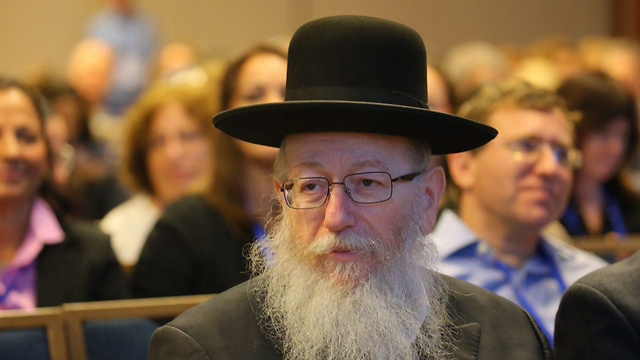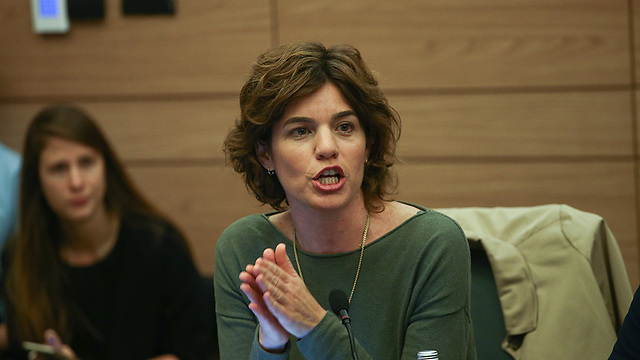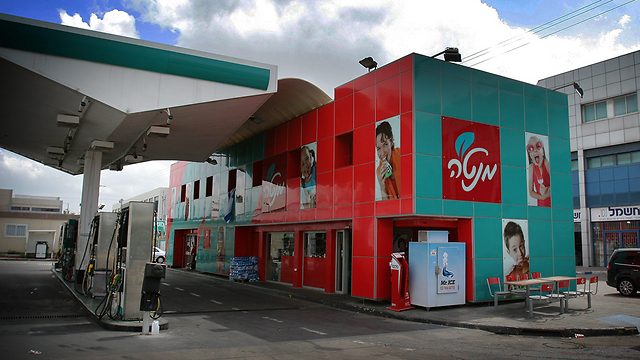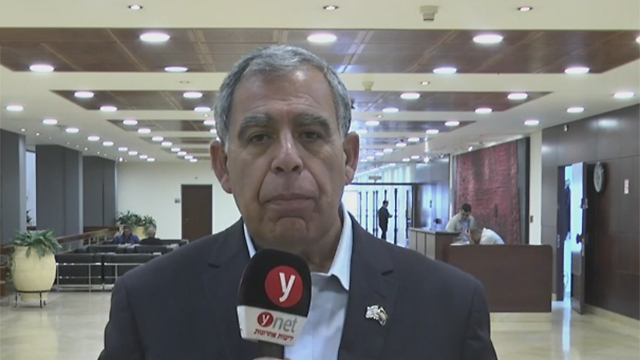
MK Litzman: Shabbat desecration is forbidden, it's in the Ten Commandments
Confident that Supermarket Law will pass, former heath minister says fewer Shabbat desecrations take place the better: 'That's what we have decided and that's what is going to happen'; Likud MK Kish: Stop populism, there is no religious coercion in the law.
Former Health Minister Ya'akov Litzman said Wednesday in a Ynet studio interview, "The less Shabbat is desecrated in Israel the better it is for me. It's in the Ten Commandments." Litzman's statements came following a legal opinion obtained by Ynet said the Supermarket Law may also forbid gas station convenience stores from remaining open on Shabbat.
The law—promoted as part of a package of promises given to the Haredi parties by Likud in order to bring the coalition crisis surrounding Shabbat train maintenance works to a close—seeks to endow Interior Minister Aryeh Deri with the authority to strike down municipal bylaws.
If the law passes, it will allow Deri to order supermarkets, grocery stores and kiosks to close on Shabbat, even in cities where bylaws permit such activities. However, the law will not apply to Tel Aviv, in accordance with the High Court's ruling on the matter and prior agreement with the Haredi parties.

The former Haredi health minister was said he was certain the law was going to pass. "I don't understand why you're defending a violation of the Hours of Work and Rest Law with such fervor. I want to defend that law. We are now trying to fix what the High Court broke, and that's what we're trying to do here," he said.
"We're safeguarding small grocery store owners, whose livelihood is in shambles, as well as Shabbat, the status quo and the coalition agreements both us and the government are committed to. That is what we have decided and what is going to happen," Litzman declared.
Regarding the possible inclusion of gas station convenience stores within the law, Litzman said, "I'm not about to get into that. Whatever the law says will be upheld."
MK Kish: 'We will not allow deviation from status quo'
"We will not allow deviation from the status quo," MK Yoav Kish (Likud) said in a Ynet studio interview on the matter. "Just as we supported the Haredi stance, we will not allow the secular public to be harmed. I think places of recreation and cafés should be allowed to be opened, with the status quo on commerce maintained, because Shabbat is important to us."
Kish also objected to the manner in which the Supermarket Law was presented to the public and said, "There's a lot of populism in the Knesset surrounding the Recommendations Law and supermarkets as well. They made it out to appear is if it contains religious coercion, which I can't abide by. The law was created because the High Court struck down existing legislation that said municipalities must consult the interior minister regarding their bylaws. The court decided that wasn't necessary, so the new law is here to set things right."
"Today the interior minister is Deri. Tomorrow it may be Yair Lapid or Avi Gabbay in a Likud government. It's legitimate and the way it's always been: the interior minister approves municipal bylaws. There's no reason to change longstanding policy on account of the High Court," Kish said.
On the opposite side of the political divide, Yesh Atid MK Mickey Levy voiced his displeasure with the law. "Look at what's going on here: a small group forces its worldview on all of Israel's citizens. I come from a religious home and respect them, but how is it any business of the interior minister if a convenience store in Sderot Ofakim or Rishon LeZion is open on Shabbat?"
"If we have to, we'll filibuster this part of it even longer than we did the Supermarket Law. We're planning to do all the way," Levy said.
Meretz MK Tamar Zandberg also objected to the law. "It's an utter absurdity that people will be able to fill up their tanks in gas stations, but not buy a bottle of water. It's clearly hypocrisy, because mass Shabbat desecration will take place with cars, but not with public transportation or supermarkets."

"Deri and Litzman's war over Shabbat has become ridiculous and their only goal is to have Shabbat in a bunker, no matter what. Their victory will be the Israeli public's loss," Zandberg said.
Local authorities across the country attempted to pass legislation allowing supermarkets to remain open on Shabbat to head off the law's passage. Rishon LeZion's city council approved an amendment to the city's law allowing businesses to remain open in industrial areas and the city's main thoroughfares. The Givatayim municipality tried to do the same, but has thus far been prevented from doing so by court order.
Moran Azulay, Alexandra Lukash and Nir Cohen contributed to this report.













